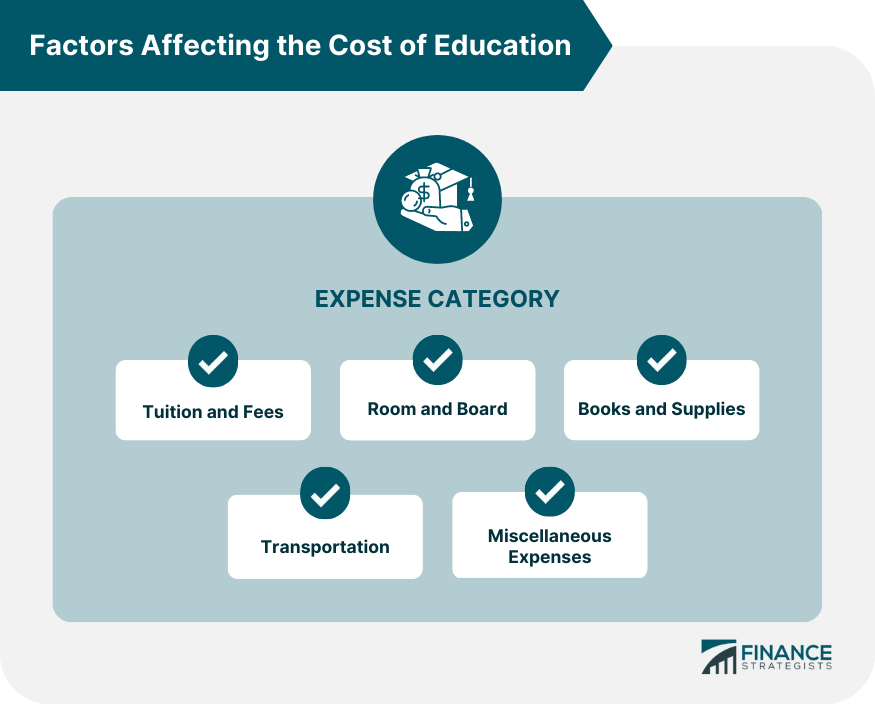Education planning is important because it helps individuals to achieve their educational and career goals in a systematic and efficient manner. By planning ahead and making informed decisions about their education, individuals can ensure that their educational experiences are aligned with their personal and professional aspirations and that they are making the most of their opportunities. Education planning also helps individuals to stay on track, manage their resources effectively, and overcome any obstacles that may arise along the way. Education is an investment, but don't go broke learning. Plan, find funding, and graduate debt-free. The cost of education is influenced by several factors, including the type of institution, location, a program of study, and length of the program. Public institutions tend to be less expensive than private institutions, and attending an in-state institution is typically more affordable than attending an out-of-state institution. To calculate the total cost of education, you will need to consider several factors, including tuition and fees, room and board, books and supplies, transportation, and miscellaneous expenses. Tuition and fees are the primary expenses associated with attending college. Tuition is the amount you pay for instruction and academic support, while fees are additional charges for services such as technology, recreation, and health care. To calculate tuition and fees, you can use the college's online calculator or look at their tuition and fees schedule. Room and board refers to the cost of living on campus or off-campus, including housing and food. On-campus housing is typically more expensive, but it provides you with the convenience of being close to your classes and other campus resources. If you choose to live off-campus, you will need to consider the cost of rent, utilities, and food. To calculate room and board, you can use the college's online calculator or look at their housing and dining options. Books and supplies are additional expenses that you will incur while attending college. This can include textbooks, course materials, and other supplies that you will need for your classes. To calculate the cost of books and supplies, you can look at the college's course catalog or use an online textbook calculator. If you need to travel to and from college, you will need to consider the cost of transportation. This can include the cost of gas, parking, and public transportation. To calculate transportation costs, you can use an online transportation cost calculator or look at your estimated mileage and fuel costs. Miscellaneous expenses are other costs that you may incur while attending college, such as personal expenses, entertainment, and clothing. To calculate miscellaneous expenses, you can use the college's online calculator or look at your estimated monthly spending. Establishing education goals is an important step in education planning. Education goals help to determine the type of institution, program of study, and length of the program that you need to pursue. It is essential to have both short-term and long-term education goals to ensure that you have a clear understanding of what you want to achieve and the steps necessary to achieve it. Once you have established your education goals, it is essential to prioritize them. This will help you to determine which goals are most important and which ones can be deferred if necessary. For example, if you have several education goals, you may want to prioritize completing a certificate program before pursuing a bachelor's degree. Once you have established and prioritized your education goals, it is important to assess the feasibility of these goals. This involves determining the resources necessary to achieve your goals, including the cost of tuition, fees, and living expenses. You should also consider the time and effort required to complete each goal. There are several funding sources available to help you achieve your education goals, including grants, scholarships, loans, and work-study programs. It is important to consider the pros and cons of each funding source and to determine which one is best for you based on your financial situation and educational goals. Grants and scholarships are two of the most common funding sources for education. Grants are typically awarded based on financial need, while scholarships are awarded based on merit. Loans are also a common funding source for education, but they must be repaid with interest. In addition to traditional funding sources, there are also alternative funding options available, such as savings and investments. Setting aside a portion of your income each month for education expenses can help to reduce the amount you need to borrow. Additionally, investing in a college savings plan, such as a 529 plan, can help to build a nest egg for education expenses. Work-study programs are another alternative funding source. These programs provide students with part-time employment opportunities to help cover their education expenses. Budgeting for education is an important aspect of financial planning. It helps to ensure that you have the resources necessary to achieve your education goals and to keep you on track financially. When creating a budget for education, it is important to consider the cost of tuition, fees, and living expenses. This will help you to determine the amount of funding you need to achieve your education goals. In addition to tuition, fees, and living expenses, there are other education-related expenses that you should consider when creating a budget. This includes books and supplies, transportation, and miscellaneous expenses. Allocating funds for these expenses will help you to stay on track financially and avoid overspending. There are several strategies that can help you to reduce the cost of education, including: Attending an in-state institution Living off-campus Taking advantage of tax credits and deductions Seeking out grants and scholarships Participating in a work-study program Student loans are a common funding source for education, but they can also result in a significant amount of debt. It is important to understand the terms and conditions of your loans and to develop a plan for repaying them. Student loans come in two forms: federal loans and private loans. Federal loans typically have lower interest rates and more flexible repayment options, while private loans are based on creditworthiness and may have higher interest rates. Once you have completed your education, it is time to start repaying your loans. You should start by creating a budget that includes your loan payments and other expenses. This will help you to manage your debt and avoid defaulting on your loans. There are several strategies that can help you to manage your education debt, including: Making extra payments Refinancing your loans Participating in a loan forgiveness program Education planning is essential to achieve academic and career goals systematically and efficiently. The cost of education is influenced by factors such as the type of institution, location, program of study, and length of the program. To calculate the total cost, individuals should consider expenses like tuition and fees, room and board, books and supplies, transportation, and miscellaneous expenses. Establishing education goals helps determine the type of institution, program of study, and program length needed to achieve one's goals. Individuals should prioritize and assess the feasibility of their education goals and identify funding sources, such as grants, scholarships, loans, and work-study programs. Budgeting for tuition, fees, living expenses, and education-related expenses is crucial for financial planning. Strategies for reducing the cost of education include attending in-state institutions, living off-campus, taking advantage of tax credits, seeking grants and scholarships, and participating in work-study programs. Managing education debt involves understanding student loans, developing a plan for repayment, and utilizing strategies like making extra payments, refinancing loans, and participating in loan forgiveness programs.Importance of Education Planning
Factors Affecting the Cost of Education

Tuition and Fees
Room and Board
Books and Supplies
Transportation
Miscellaneous Expenses
Setting Education Goals
Establishing Education Goals
Prioritizing Education Goals
Assessing the Feasibility of Education Goals
Identifying Funding Sources
Traditional Funding Sources
Alternative Funding Sources
Creating a Budget for Education
Budgeting for Tuition, Fees, and Living Expenses
Allocating Funds for Education-Related Expenses
Strategies for Reducing the Cost of Education
Managing Education Debt
Understanding Student Loans
Repaying Student Loans
Strategies for Managing Education Debt
Final Thoughts

Education Planning FAQs
Education Planning is the process of preparing for the financial aspect of education, including tuition fees, living expenses, and other related costs. It involves setting education goals, identifying funding sources, creating a budget for education, and managing education debt.
Financial planning is an integral part of education planning as it helps to determine the feasibility of your educational goals and ensures that you have the resources necessary to achieve them. It helps you to budget for tuition, fees, and living expenses and manage your education debt effectively.
Traditional funding sources for Education Planning include grants, scholarships, and loans. Grants and scholarships are typically awarded based on financial need or merit, while loans must be repaid with interest.
Alternative funding sources for Education Planning include savings, investments, and work-study programs. Setting aside a portion of your income each month for education expenses and investing in a college savings plan can help to reduce the amount you need to borrow. Work-study programs provide students with part-time employment opportunities to help cover their education expenses.
Strategies for managing education debt in Education Planning include making extra payments, refinancing your loans, and participating in a loan forgiveness program. It is important to understand the terms and conditions of your loans and to create a budget that includes loan payments and other expenses to manage your debt effectively.















